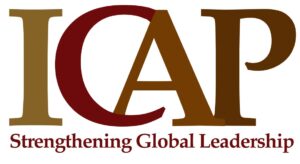Korbel ranked 12th best place in the world to earn a master’s degree in international relations.
Korbel ranked 20th in the world for the best undergraduate degree in international studies.
Korbel ranked 12th best place in the world to earn a master’s degree in international relations.
Korbel ranked 20th in the world for the best undergraduate degree in international studies.

ICAP is based on the conviction that the leadership of the United States should be recruited from and should reflect our entire society, without regard to gender, race, ethnicity, religion, or sexual orientation. There are some programs designed to increase the pool of those with credentials for successful public service and international careers. These serve an important role. However, simply increasing the pool of talented professionals with graduate credentials and an interest in international affairs does not necessarily lead to higher quality at the most senior levels of leadership. We need to take steps to assist and mentor recruits to rise to the highest levels of international public service. ICAP is designed to help to achieve this goal.


During the annual week-long seminar, ICAP brings together highly promising mid-career professionals with senior officials, faculty and staff at the Aspen Institute and then follows the program with additional activities designed to reinforce ICAP's impact. The beautiful mountain setting of the week-long seminar, away from the office and the constant pressures of work, enables participants to focus on the program, reflect on their careers and develop relationships within the group. The ICAP seminar at Aspen includes discussions of policies and leadership, career workshops and individual advising, mentoring from senior officials, and informal occasions for group bonding, all intended to:
In addition to these aspects of the seminar, each mid-career participant meets with a career counselor for individual career discussions, advice and planning.

Tom Rowe, Ph.D., is the founder and Director of the International Career Advancement Program (ICAP), co-founder and Senior Adviser and Treasurer of the Global Access Pipeline (GAP) and Dean Emeritus at the University of Denver. He served for 46 years on the faculty, including nine years as Dean of the Graduate School of International Studies (now the Josef Korbel School), as well as five years as Associate Dean. He was earlier on the faculty of the University of Connecticut and Virginia Polytechnic Institute and State University. He has been a visiting faculty member at the University of Colorado in Boulder and the Institut fur Politikwissenschaft at the University of Tuebingen in Germany. He has spoken widely in the United States, Europe, Ghana and Costa Rica. He has received grants from a large number of governmental agencies, foundations and other organizations. He currently has a grant for ICAP from the Open Society Foundations.
Dr. Rowe grew up on a small farm in Michigan. He completed his undergraduate training at the University of Michigan and his MA and PhD degrees at the University of California-Berkeley. His broad areas of specialization are in international politics and international organization, with particular attention to the United Nations, international human rights, and conflict management and resolution.
Dr. Rowe has published several book chapters, a monograph on the United Nations and articles in International Organization, the American Political Science Review, the Journal of Conflict Resolution and Relaciones Internacionales. He has served as President of International Organization Section of the International Studies Association, as President of the Western International Studies Association, as a member of the Executive Board of Association of Professional Schools of International Affairs (APSIA), as a member of the National Policy Board of the Public Policy and International Affairs (PPIA) Program and as a member of the National Selection Committees for the Charles Rangel Fellowship Program and for the Thomas Pickering Fellowship Program.

Angela Martinez is the Program Coordinator for the International Career Advancement Program (ICAP) at the Josef Korbel School, University of Denver. She also serves as a liaison to the International Career Advancement Program Fellows Association and is currently pursuing a Master’s degree in International Development at the Josef Korbel School. In these roles, she supports leadership development for mid-career professionals in international affairs, fosters strategic partnerships, and facilitates program initiatives that strengthen leadership in global policy and governance.
Her prior experience includes serving as a Legislative Policy Intern for Colorado House Representative Alex Valdez and as a campaign intern for Westminster City Councilman Obi Ezeadi. These roles strengthened her expertise in legislative support, research, and community engagement. Additionally, Angela has collaborated with the Belize government, local communities, and non-governmental organizations, facilitating discussions on environmental sustainability and cross-sector collaboration.
Angela holds a Bachelor of Arts in Political Science from the University of Denver, with minors in Leadership Studies and Critical Race and Ethnic Studies, graduating with distinctive honors. She was actively involved in the Pioneer Leadership Program (PLP) and earned multiple accolades, including the Dean's List, Denver Scholarship, DU Educational Grant, Tolstoi Guild Scholarship, and Hornbeck Scholar Honorees, demonstrating her commitment to academic excellence.
Copyright ©2025 | All Rights Reserved | Equal Opportunity Affirmative Action Institution